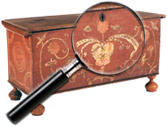Frank Weston Benson (American, 1862 to 1951)
Frank Weston Benson was born in Salem, Massachusetts in 1862. He studied at the Museum School of Fine Arts in Boston and the Academie Julian in Paris. Benson was a hunter and often depicted sporting scenes of birds in his artwork. The landscape around his studio on North Haven Island, Maine provided inspiration for his etchings and paintings. Benson taught at the Boston Museum of Fine Arts and in the Society of Art in Portland, Maine.
Information courtesy of Harlowe-Powell Auction, July 2011.
A leading figure in American art at the end of the 19th century, Frank W. Benson earned renown in his own lifetime as one of the principle artists of the Boston school, and as a member of the influential group of painters called “The Ten.” Despite the acclaim he received from his contemporaries, Benson led a largely private life, devoted to his family, his friends and his art. The artist’s children served as his favorite models and Benson’s paintings of his family are among his most successful achievements.
Born and raised in Salem, Massachusetts, Benson received his earliest artistic training at the School of the Museum of Fine Arts in Boston, where his classmates included Willard Metcalf, Robert Reid and Edward Simmons. In the fall of 1883, Benson left Boston for Paris, where he spent three years studying art at the Academie Julian. The years following Benson’s return to Boston were eventful ones for the young artist, punctuated by his marriage to Ellen Perry Peirson in October of 1888 and his appointment as an instructor at the Museum School in April 1889.
His teaching career provided Benson with a steady income to support his growing family, but also left the artist plenty of time to paint; Benson’s work of this period consisted primarily of formal portraits and landscapes painted during his summers spent with close friends Edmund Tarbell and Abbott Thayer in New Hampshire.
Benson’s discovery of North Haven Island, off the coast of Maine, marked a turning point in both the artist’s personal and professional development. On his first visit in 1900, Benson was enchanted by the brilliant sunlight that spilled over the island’s open fields and the sweeping views of the sea and sky beyond. The Benson family returned to North Haven every summer thereafter, eventually purchasing Wooster Farm, a rambling Federal style farmhouse and barn set in the midst of grassy meadows and bordered on three sides by the sea.
In North Haven, with the barn converted into a studio and the old house brimming over with the Benson’s children and friends, Wooster Farm became an idyllic retreat for the artist. Free from competing influences, Benson’s individual style finally emerged. Nearly everyday was spent outdoors, berry-picking, picnicking on the beach, fishing or sailing, affording the artist the opportunity to paint his favorite subjects – his children – en plein air.
Information courtesy of Sotheby’s, December, 2008.
